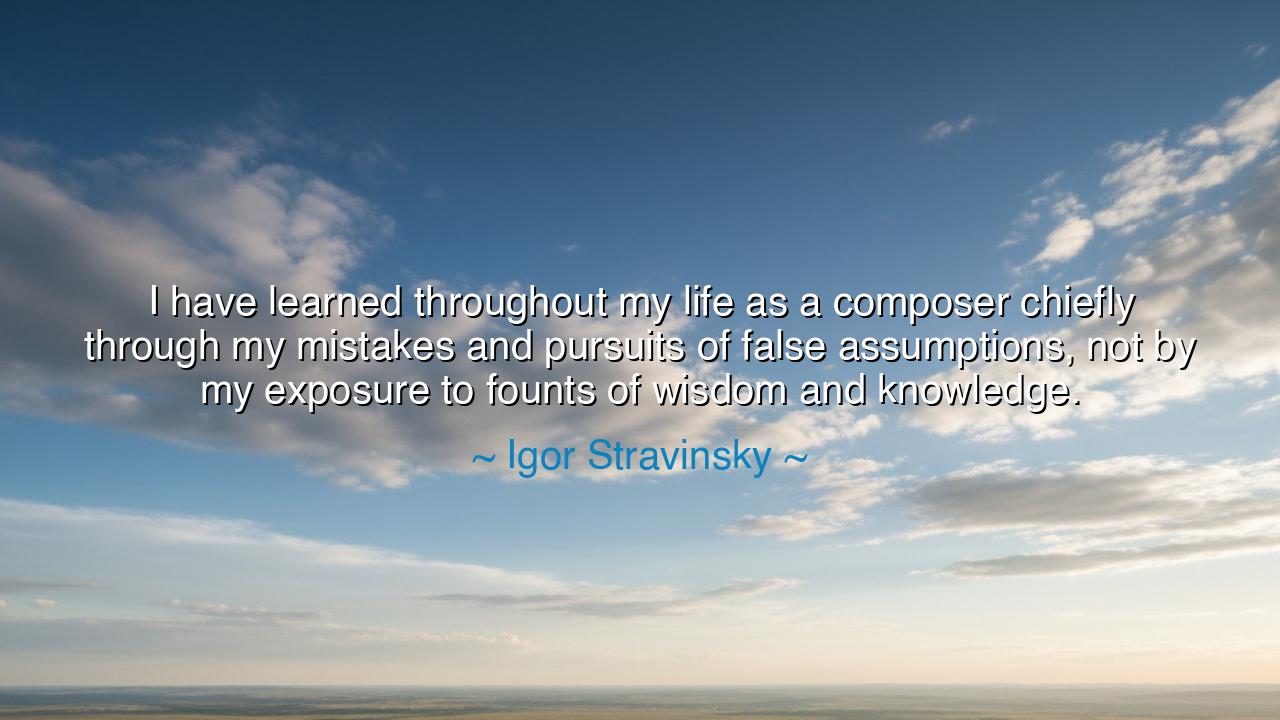
I have learned throughout my life as a composer chiefly through
I have learned throughout my life as a composer chiefly through my mistakes and pursuits of false assumptions, not by my exposure to founts of wisdom and knowledge.






Hear the confession of Igor Stravinsky, master of dissonance and rhythm, who declared: “I have learned throughout my life as a composer chiefly through my mistakes and pursuits of false assumptions, not by my exposure to founts of wisdom and knowledge.” These words, though spoken by a man of towering genius, carry a humility that shines brighter than his fame. For Stravinsky admits that his path to greatness was not lit by the torches of others, but forged in the fires of his own errors. He teaches us that mistakes are not enemies of progress but companions of discovery, guides that lead the seeker toward deeper truth.
In these words, Stravinsky unmasks the illusion that wisdom is handed down fully formed. He tells us that true learning comes not from merely drinking at the founts of wisdom, but from grappling with what is wrong, from daring to test what fails, from pressing against false assumptions until they break and reveal the path forward. To pursue perfection without error is to remain shallow; to embrace the lessons of failure is to reach greatness. Thus, the composer declares that knowledge without experience is like a score unread, while mistakes are the performance that brings the music to life.
Consider the history of invention and art, which is filled with the power of failure. Thomas Edison, when creating the electric light, tested thousands of filaments that failed before finding one that endured. When asked about his failures, he replied that he had not failed, but found thousands of ways that would not work. In the same way, Stravinsky reminds us that his bold innovations—the wild rhythms of The Rite of Spring, the strange harmonies that shocked audiences—were born out of errors, false paths, and daring attempts that others might have called mistakes. From the rubble of failure, he built monuments of sound.
This truth is heroic, for it requires courage. To learn from mistakes demands that one endures shame, criticism, and doubt. When Stravinsky’s Rite of Spring premiered in Paris in 1913, the audience erupted in outrage. The music was so unlike anything they had known that they shouted, rioted, and nearly drowned out the orchestra. To many, it seemed a disaster. Yet within that chaos lay the seed of revolution, for the very piece that was first mocked as failure is now honored as one of the greatest works of the modern age. Thus do we see that what appears false may yet conceal truth, and what begins in rejection may end in glory.
Stravinsky’s wisdom teaches us that mistakes are not detours but necessary roads. The soul that fears error will never dare to create. The mind that seeks only safe knowledge will never discover new truths. Just as the sculptor chips away at stone, leaving behind broken fragments, so the seeker chips away at falsehoods, leaving behind mistakes until the form of truth emerges. The fragments are not wasted; they are proof of the work, testimony of the struggle that carved beauty from resistance.
The lesson is clear: do not despise your mistakes. Welcome them as teachers. When you falter, ask what truth lies hidden within your error. When you pursue false assumptions, let them fall away, knowing they have brought you closer to what is real. Do not measure your journey only by successes, but also by the courage with which you faced failure. For in the end, your mistakes will form the foundation upon which your wisdom stands.
So I say to you: live boldly, create freely, and do not fear to stumble. For it is through stumbling that one learns to walk; through discord that one finds harmony; through failure that one discovers greatness. As Stravinsky declared, the greatest wisdom may not come from fountains already flowing, but from the dry wells you dig until at last water springs forth.
Thus shall his words endure as a guide for every seeker, artist, and dreamer: wisdom is born not from the avoidance of error, but from the embrace of it. In your mistakes lies your truest teacher, and in your failures lies the hidden key to your triumph.






AAdministratorAdministrator
Welcome, honored guests. Please leave a comment, we will respond soon